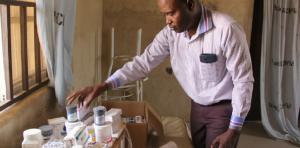Healing the mental scars of violence in northeastern Nigeria
It began as a hot autumn day like any other for Aisha (pseudonym). The girl with big eyes was looking out of the window of her house, watching a group of men approach her brothers who were harvesting crops. Aisha thought they were family friends because they came up close to her siblings.
Her mother Gaji was doing her household chores when she heard her 13-year-old daughter let out a piercing scream.
"Mother, they are killing my brothers!" cried out Aisha.
After that, Gaji doesn’t remember much except that somehow she fled with her daughter to the surrounding countryside. They returned later to bury the young men who, like so many others, were murdered by insurgents.
The killings which Aisha witnessed aggravated her already fragile mental state.
“She became violent, kicking and fighting everyone,” said Gaiji. “I couldn’t control her.”
Initially the mother and daughter returned to their home in northeastern Nigeria, but the armed rebels made forays into that community as well. So Gaji moved with Aisha to Bakass, a camp for internally displaced people on the outskirts of Maiduguri in Borno state.
Gaji worried about her daughter, who had trouble communicating and would often disappear.
“I couldn’t leave her alone, because I wasn’t sure what she would do,” said Gaji.
Nearly 7 million people are living in camps for internally displaced people (IDP) in northeastern Nigeria.
In emergency settings, the rate of common mental disorders can double. Gender based violence, abductions, and gross atrocities can trigger psychological problems which take years to heal.
WHO estimates that as many as 1 in 5 people in IDP camps may need mental health care.
Despite this huge and urgent demand for care, there is only one specialized mental health facility in the whole region. The Federal Neuro-Psychiatric hospital of Maiduguri has seen the number of its patients increase significantly.
“In a humanitarian crisis, mental health is often neglected because the focus is on saving lives due to preventable infectious diseases such as diarrhea, respiratory tract infections and malaria,” said Dr Wondimagegnehu Alemu, WHO Representative to Nigeria. “But WHO has made mental healthcare one of its top priorities in northeastern Nigeria.”
In September 2017, WHO, Borno state authorities and the Federal Neuro-Psychiatric hospital teamed up to launch the mental health Gap Action Programme (mhGAP). The partners trained 64 primary healthcare workers in IDP camps and other humanitarian facilities to recognize and treat mental disorders which are common in emergency settings.
Aisha was one of the first beneficiaries of the programme. She began her treatment in October 2017 in the Bakass camp. Falmata Muhammed is a primary healthcare worker who provides psychosocial support to Aisha once a week.
If Falmata has questions over how to handle difficult cases she can turn to her supervisor, Umar Musami, Psychiatrist, Federal Neuro Psychiatric Hospital. Umar visits Bakass camp every two weeks to also treat patients and observe Falmata.
“I either supervise her in person or she calls me on the phone and tells me the patient’s symptoms and I will advise her on what to do,” said Umar.
In the first five months of the programme, 5 000 people accessed mental healthcare in 36 primary healthcare facilities. In 2018, WHO is scaling up the pilot intervention and training 70 additional health workers across northeastern Nigeria.
For Aisha, her treatment is helping her to overcome the scars left behind by that autumn day when her world broke apart.
“Aisha has improved remarkably,” said Umar. “When she came she was having severe psychological issues, but she is now doing better.”
Aisha can now help her mother with household chores.
“I don’t fight with people anymore and I can go on errands,” said Aisha. She now dreams of becoming a civil servant.



